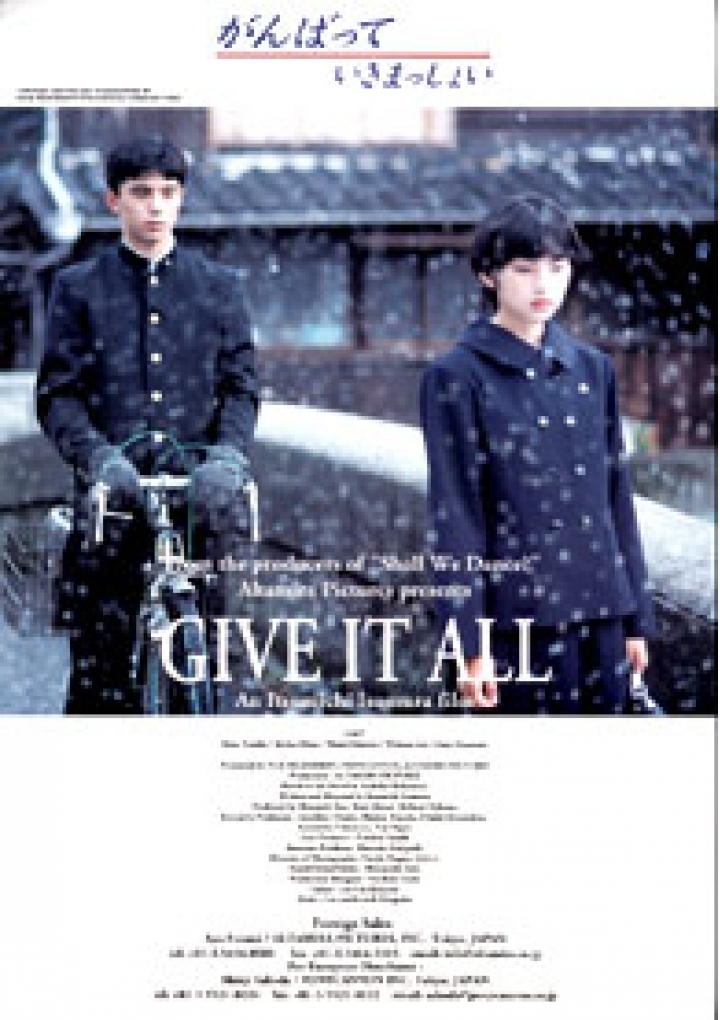GIVE IT ALL
Original Title
がんばって いきまっしょい
Ganbatte ikimasshoi
-

-
Release : Oct-10-1998 Duration : 120min. STAFF
Director : Itsumichi Isomura (MOTHER'S TREES) Screenplay : Itsumichi Isomura (MILK WHITE) CAST
Rena Tanaka (The Crimes That Bind) Mami Shimizu Kirina Mano (By Player)
INTRODUCTION
"Give It All" was released in one small, independent theatre in September last year. Although it's a readily identifiable story about the adolescence of average teenage high school girls, it struck a deep chord in JAPAN. Eight months later, this gentle film had won a legion of devoted fans and continues its highly-profiled nationwide theatrical release.
The film is set in the 1970's. Since this era, JAPAN has undergone massive changes; not at all of them for the good. Now surrounded by great material prosperity, people are beginning to be troubled by the thought that perhaps something is missing from their lives. One aspect of this is that it is no longer deemed 'cool' or respectable to have any enthusiasm for life. Passion has become a thing of the past. Perhaps a longing for this passion is the reason behind the tears so many young people shed when they see this film.
Five girls were chosen at auditions held across JAPAN. With no experience of acting or rowing and having never journeyed away from their parents, it was a two month struggle for them to master the roles. This growth exactly mirrors the blossoming of the characters in the film in a beautiful paralleling of art and life. The actresses all went on to win a variety of awards for their debut performances. Kirina Mano was selected by Peter Greenaway for his latest film "8 1/2 Women" while the heroine, Rena Tanaka, took 11 'best newcomer' awards, cnsuring that the film was one of the most talked-about features of 1998.
Writer/director Itsumichi Isomura was also highly acclaimed for the sensitivity, lack of sentimentality and objectivity in his treatment of the fragility of youth. The film garnered 25 awards, among them prizes for direction, cinematography and sound. It was also named pick of the year by many crities.
The soundtrack was composed under the direction of top Korean singer-songwriter, Lee-tzsche. Her music created a soaring, poetic accompaniment to the beautiful vistas of the southern JAPAN landscape. The film was produced by Altamira Pictures INC. the company formed by Producers, Shoji Masui and Director, Masayuki Suo, who created the international hit,"Shall We Dance?" This film was distributed by Miramax Films and holds the record as the highest-grossing Asian language film in U.S. box office history (US$ 10 million). It has since gone on to play in 29 countries around the world.
STORY
Shikoku Island, the fourth largest island in the Japanese archipelago. Matsuyama, a historical, quiet town facing the serene inland sea 1976,after the turmoil of years of student demonstrations, there came a time of nihilism. The new generation was given the nickname "Age of Three Nothings" signifying "Giving nothing, caring fornothing, being moved by nothing".
Etsuko (15) lives with her reticent father and hard-working, fussy mother. They run a little dry-cleaning business. With them is Etsuko's grandmother who looks after the house and her 'brilliant' older sister who is leaving to attend a top college. Etsuko feels useless, with no role to play in the household.
The irony is that even though she is far from being an excellent student, she still managed to get into the best local high school. The emptiness of this achievement only worsens her sense of futility.
One day she decides to run away from home. Her family don't flinch, assuming she just went out for a walk. Despondent and alone, even this gesture ignored, Etsuko stands on the sea shore and stares out across the waves. In the distance, she caches sight of something it's a rowing team gliding through the water. At that moment something sparks inside her. She can't get this image out of her mind and sets herheart on joining the rowing team at the new school. However she finds out that since it used to be a boys' school, traditional attitudes persist: there is no rowing team for girls. In a solution to all her recent frustrations with life, she decides to do something about this. She bullies four other girls into forming a team. With their hearts not really in it however, their season ends in a humiliating defeat. Further burdened by the appearance of her childhood sweetheart on the boy's team, she begins to flounder. An awkward relationship with their melancholic coach followed by an injury that bars her from sport, threaten to wreck Etsuko's self-confidence. Just when it seems she will have to give up all that she struggled for, she finds it in herself to continue."Rowing is everything for me", she says. By the second reason, the girls have grown. With one voice they pull their oars through the water, heading for their first victory.

